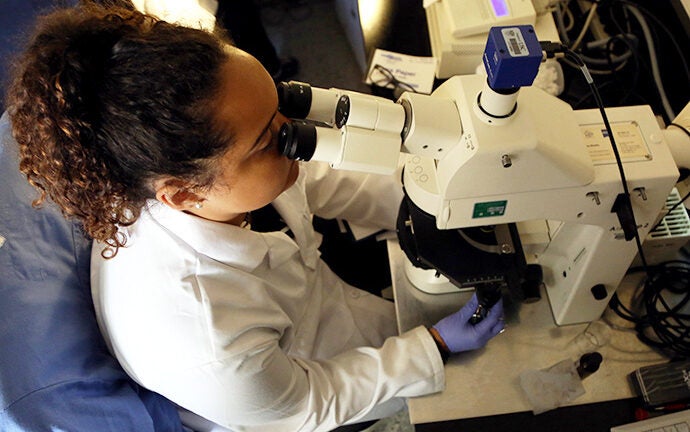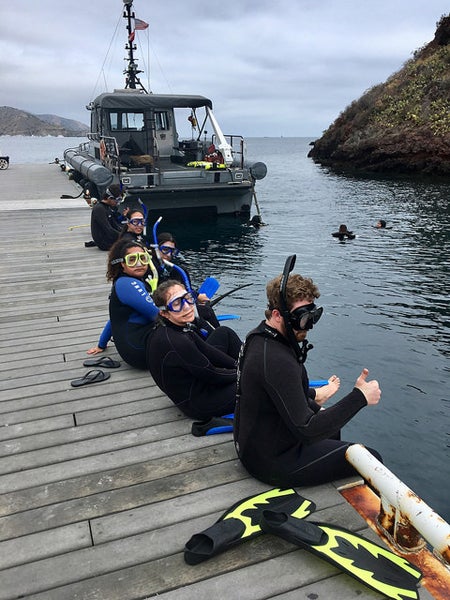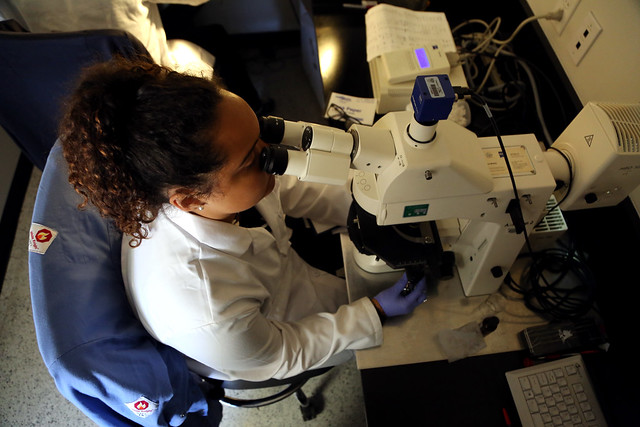
Community college students train at USC Dornsife to characterize new microbe
Raquel Diaz jumped at the chance to spend this past summer in California. The New Jersey native was eager for the chance to travel, and even more excited by the thought of helping to grow and describe a recently discovered life form.
Diaz came to USC Dornsife as a participant in the Community College Cultivation Cohort (C4) program offered by the Center for Dark Energy Biosphere Investigations (C-DEBI).
In the C4 program, Diaz was part of a team of community college students learning state-of-the-art scientific techniques ranging from DNA sequencing to microscopy and sterile techniques to analytical chemistry from USC Dornsife researchers. Their mission was to use the methods they learned to characterize a new bacterial species isolated in 2013 off the coast of California’s Santa Catalina Island by National Science Foundation postdoctoral fellow Roman Barco. USC Dornsife’s Barco, who continues to work with the organism in his research, is also one of the mentors for the C4 cohort.
Students in C4, who hail from community colleges around Los Angeles and the U.S., are tasked with learning everything there is to know about this ubiquitous new marine microbe tentatively named “Hydrogenovibrio sp. SC-1”: what it looks like, the characteristics of its genome, its temperature limits, the pH at which it will grow and so on. At the conclusion of their research, the students’ names appear on two academic papers categorizing the microbe. Their findings will help scientists better understand the ecology of the ocean’s subseafloor. The microorganisms that inhabit the deep biosphere are largely unknown and play an important role in its biogeochemistry.
Jan Amend, C-DEBI director and professor of Earth sciences and biological sciences, oversees the C4 program. He recalled the reaction students had when he conveyed how crucial their work will be to understanding SC1.
“I told them tomorrow you will know more about this organism than anybody on the planet. They did not believe it,” Amend said.
Filling a void in science career skills

On Catalina Island at the Wrigley Marine Science Center students snorkeled and discovered the local flora and fauna. Photo by Stephanie Schroeder.
Prior to attending C4 at USC Dornsife, Diaz, who studied biology and is interested in a career that combines ecology and environmental studies, had never conducted research in a lab. Through the C4 program, Diaz learned how to take samples of microorganisms, grow microbes and use laboratory equipment, among other skills.
“Learning the basic skills have been very helpful,” Diaz said. “My training will translate really well when I move to a different lab, and now I’m not as intimidated by that first step or afraid to ask questions.”
The National Science Foundation-funded Research Experience for Undergraduates C4 program supports eight undergraduate community college students with a weekly stipend plus lodging and travel funds as they spend nine weeks interning in USC Dornsife science labs. First-generation college students, women and under-represented minorities are encouraged to apply.
For many community college students, getting substantial scientific lab experience can be a challenge, which can influence their prospects for studying science down the line, explains Amend.
“One of the big hurdles that community college students face when they try to transfer to four-year schools is they don’t have the research experience,” he said. “That makes it more difficult to get into a research lab when they come to a four-year school because they’re only here for two years, which then puts them behind other students when it comes to applying to graduate school.”
C-DEBI, a National Science Foundation–funded Science and Technology Center and flagship hub for scientists who study the marine subsurface biosphere, focuses a significant amount of attention on education outreach programs. Amend and other C-DEBI scientists, seeing an opportunity to fill a void for community college students looking to beef up their research skills, launched the C4 program in 2016.
SLIDESHOW: The C-DEBI C4 program brings community college students to USC for hands-on science.
Explore their experiences with the slideshow above. Photo credits as noted.
Karla Abuyen participated in the inaugural C4 cohort when she was a student at Cerritos Community College in Norwalk, Calif. Now a senior environmental studies and health major at USC Dornsife, she spent this past summer as a mentor for the second C4 cohort. The experience has been central to her career trajectory.
“I’m planning on going into graduate school and this opportunity that I’ve been given — doing research and being able to mentor — is really an introduction into what graduate school or academia will be like, Abuyen said. “The opportunities, guidance and encouragement from the USC C-DEBI community has given me the self-assurance and confidence that a career in research isn’t far-fetched.”
A sea of possibilities
For Alex Cervantes, who also attended Cerritos, the C4 program helped him to focus his career interests. Previously, he had spent time volunteering in a hospital but decided to try research to see if might be more interested in working in a lab. He learned that he likes both. This fall, he transferred to the University of California, Berkeley, where he will study public health.
“Public health is basically studying how diseases are spread, and in the C4 program we study microorganisms, which help me understand microbes — one of the ways that diseases are spread.”
For Diaz, connecting with mentors who shared a path that was similar to hers helped her to cement her plan for the future. She learned that Barco also began his studies at a community college.
“That was comforting,” she said. “One of the reasons I was so intimidated was because sometimes there’s a stigma of being a community college student.”
Diaz has been admitted to Ramapo College in Mahwah, New Jersey. She’s already begun emailing professors about potential opportunities to work in their labs. She’s also thinking ahead to the possibility of attending graduate school.
“Before C4, I didn’t understand everything that went into grad school,” she said. “Now it’s more concrete because I can see how I can actually get there.”
